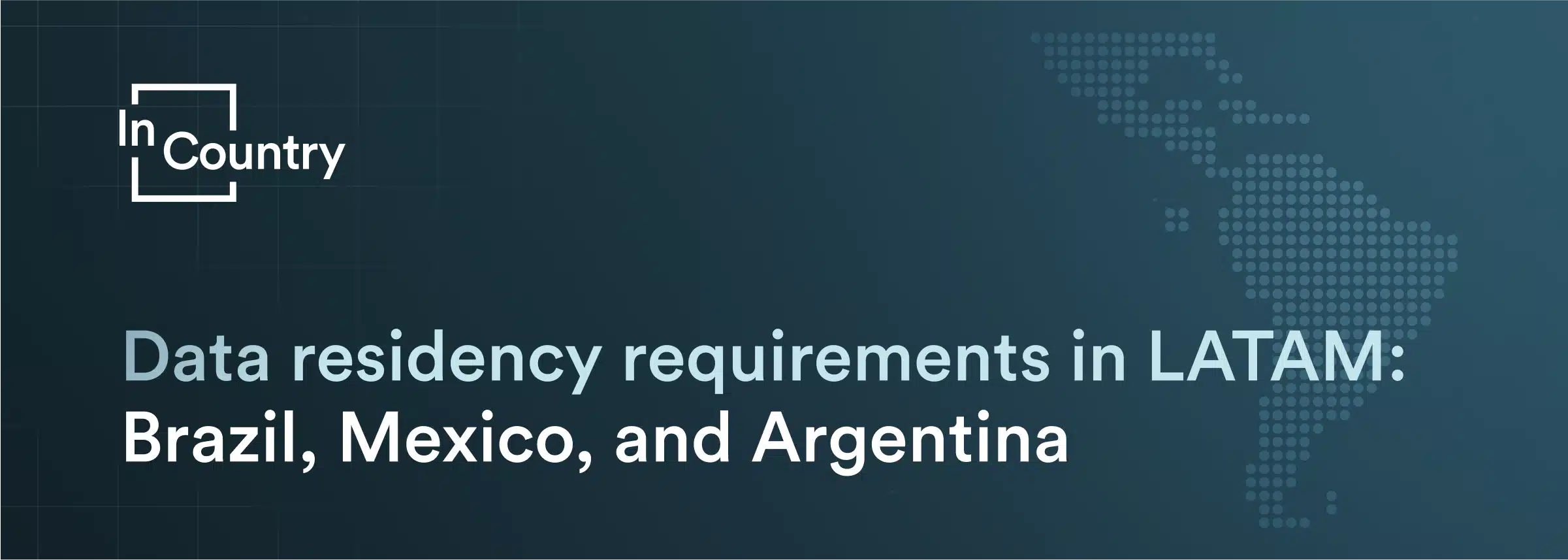As data privacy regulations tighten across the globe, Latin America (LATAM) is emerging as a region where data residency, data sovereignty, and localization laws are rapidly evolving. Countries like Brazil, Mexico, and Argentina are establishing frameworks that mandate how companies collect, process, and store personal data within national borders. For multinational organizations and cloud-based service providers, understanding and navigating the unique compliance requirements in these markets is crucial.
In this article, we will explore the data residency requirements in LATAM, focusing specifically on Brazil, Mexico, and Argentina. We’ll analyze current regulations, cross-border data transfer limitations, and provide insights into how to stay compliant in each jurisdiction.
What is data residency and why it matters in LATAM
Data residency refers to the legal requirement that data be stored in a specific geographic location. It is closely tied to data sovereignty, which gives nations the authority to regulate data stored within their borders. In LATAM, this concept is increasingly important as governments aim to protect citizen data, ensure national security, and foster local economic development.
Compliance with LATAM data residency laws is critical for:
- Avoiding legal penalties and sanctions
- Gaining consumer trust
- Enabling cloud data compliance in LATAM markets
- Operating efficiently in highly regulated sectors such as finance, healthcare, and education
Brazil: Data Residency under the LGPD
Brazil’s General Data Protection Law (Lei Geral de Proteção de Dados or LGPD) came into full effect in 2020 and has since set a precedent for other LATAM countries. While the LGPD does not mandate strict data localization, it requires companies to adopt adequate technical and administrative measures for data protection.
Key data residency highlights in Brazil:
- Cross-border data transfers are allowed only if the receiving country ensures an adequate level of data protection.
- Consent, contracts, or specific legal provisions must justify international data transfers.
- The national authority, ANPD (Autoridade Nacional de Proteção de Dados), can investigate and fine companies for non-compliance.
Brazil LGPD data residency compliance tips:
- Assess where data is currently hosted and processed
- Classify data types (personal, sensitive)
- Ensure third-party vendors meet LGPD compliance
- Maintain documentation for international data transfers
Mexico: Data Localization with sectoral nuance
Unlike Brazil, Mexico does not have a single overarching data protection law, but rather a combination of regulations, primarily the Federal Law on Protection of Personal Data Held by Private Parties (LFPDPPP). It does not impose broad data residency or localization mandates, but requirements may vary by sector.
Key data compliance Mexico regulations:
- Organizations must inform users if personal data will be transferred internationally
- Cross-border data transfer requires express consent in many cases
- Sectors like finance and telecommunications have their own strict data localization rules
Cloud data compliance Mexico recommendations:
- Review applicable sectoral guidelines (e.g., fintech, healthcare)
- Obtain and document user consent for data transfer
- Partner with cloud providers that support Mexican data protection standards
For SaaS companies, complying with data residency rules for cloud services in Mexico may require local data centers or hybrid cloud models.
Argentina: Data sovereignty via Habeas Data Law
Argentina was the first Latin American country to be recognized by the EU as having adequate data protection standards. The country’s Habeas Data law governs the processing and transfer of personal data and is enforced by the National Directorate for Personal Data Protection.
Argentina data protection regulations:
- Personal data must be handled transparently and securely
- Transfers outside Argentina require the receiving country to have adequate protection levels
- Companies must register their databases with the local authority
Argentina data storage requirements 2025 and beyond:
- Increased focus on cloud compliance for SaaS and global providers
- Renewed enforcement actions from regulators
- Encouragement of local data hosting where practical
To ensure data residency compliance in Argentina:
- Conduct regular data audits
- Implement localization-friendly architecture
- Train staff on national data handling obligations
Cross-border data transfer restrictions in LATAM
Cross-border data transfer LATAM policies generally require:
- Adequate levels of data protection in recipient countries
- User consent or contractual safeguards
- Governmental or sector-specific approvals in sensitive industries
Many LATAM nations align their transfer restrictions with EU GDPR adequacy principles. For international businesses, this means adopting privacy-by-design frameworks and ensuring data controller responsibilities in LATAM are clear and enforceable.
Cloud data compliance in LATAM
Cloud computing services face unique challenges in LATAM due to data residency requirements. While major providers like AWS, Azure, and Google Cloud have regional availability zones, businesses must verify:
- Where customer data is physically stored
- How backups and redundancies are managed
- Whether their cloud vendors meet LATAM SaaS compliance obligations
How to stay compliant: Best practices for LATAM data residency
To meet data localization in Latin America requirements and maintain compliance, companies should:
- Map your data: Understand where all personal and sensitive data is stored and processed.
- Review vendor contracts: Ensure third-party providers adhere to local regulations.
- Localize where needed: Host data in-country where required by law or sector.
- Stay updated: LATAM data protection laws are evolving rapidly. Monitor regulatory changes.
- Educate teams: Train employees on data controller responsibilities in LATAM.
- Work with local counsel: Legal experts can help interpret sector-specific and cross-border rules.
InCountry: Your partner in LATAM data residency compliance
InCountry provides data residency-as-a-service, enabling global companies to operate in compliance with local data protection laws without building separate infrastructure for each market. For Brazil, Mexico, and Argentina, InCountry offers localized data storage in-country and seamless integration with major SaaS platforms like Salesforce
With InCountry, you can address data localization in Latin America while maintaining operational efficiency and security.
